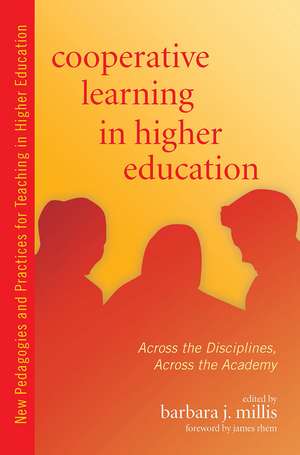Cooperative Learning in Higher Education: Across the Disciplines, Across the Academy
Editat de Barbara Millisen Limba Engleză Paperback – 27 apr 2010
Preț: 206.91 lei
Nou
Puncte Express: 310
Preț estimativ în valută:
39.59€ • 41.56$ • 32.86£
39.59€ • 41.56$ • 32.86£
Carte disponibilă
Livrare economică 20 martie-03 aprilie
Livrare express 06-12 martie pentru 22.71 lei
Preluare comenzi: 021 569.72.76
Specificații
ISBN-13: 9781579223298
ISBN-10: 157922329X
Pagini: 256
Dimensiuni: 152 x 229 x 18 mm
Greutate: 0.33 kg
Ediția:1
Editura: Taylor & Francis
Colecția Routledge
Locul publicării:Oxford, United Kingdom
ISBN-10: 157922329X
Pagini: 256
Dimensiuni: 152 x 229 x 18 mm
Greutate: 0.33 kg
Ediția:1
Editura: Taylor & Francis
Colecția Routledge
Locul publicării:Oxford, United Kingdom
Public țintă
Postgraduate and Professional Practice & DevelopmentCuprins
PREFACE LIST OF CONTRIBUTORS 1. WHY FACULTY SHOULD ADOPT COOPERATIVE LEARNING APPROACHES—Barbara J. Millis 2. COOPERATIVE LEARNING IN ACCOUNTING—Phillip G. Cottell 3. COOPERATIVE LEARNING IN GENERAL CHEMISTRY THROUGH PROCESS-ORIENTED GUIDED INQUIRY LEARNING—Susan E. Shadle 4. COOPERATIVE LEARNING STRUCTURES HELP COLLEGE STUDENTS REDUCE MATH ANXIETY AND SUCCEED IN DEVELOPMENTAL COURSES—Theodore Panitz 5. COOPERATIVE LEARNING IN EDUCATIONAL PSYCHOLOGY. MODELING SUCCESS FOR FUTURE TEACHERS—Margaret W. Cohen 6. PREPARING THE NEXT GENERATION OF ENGINEERING EDUCATORS AND RESEARCHERS. COOPERATIVE LEARNING IN THE PURDUE UNIVERSITY OF ENGINEERING PhD PROGRAM—Karl A. Smith, Holly Matusovich, Kerry Meyers, and Llewellyn Mann 7. THE INTERACTIVE LECTURE IN A RESEARCH METHODS AND STATISTICS CLASS—Pamela Robinson and James L. Cooper 8. WANT BRIGHTER, HARDER WORKING STUDENTS? CHANGE PEDAGOGIES! SOME EXAMPLES, MAINLY FROM BIOLOGY—Craig E. Nelson 9. SEQUENCING COOPERATIVE LEARNING ACTIVITIES IN LITERATURE CLASSES—Barbara J. Millis 10. IMPLEMENTING COOPERATIVE LEARNING IN INTRODUCTORY ECONOMICS COURSES—Mark H. Maier, Kim Marie McGoldrick, and Scott Simkins 11. COOPERATIVE LEARNING IN GEOLOGICAL SCIENCES—Edward Nuhfer 12. CONCLUDING THOUGHTS ON THIS VOLUME—Barbara J. Millis BIBLIOGRAPHY THE CONTRIBUTORS INDEX
Notă biografică
Barbara Millis is Director of the Teaching and Learning Center, University of Texas at San Antonio, having previously served as Director of faculty development at the U.S. Air Force Academy. Prior to that, she worked in faculty development at the University of Maryland University College. She frequently conducts workshops at professional conferences and campuses around the country. James Rhem
Descriere
The authors describe the application of cooperative learning in biology, economics, educational psychology, financial accounting, general chemistry, and literature at remedial, introductory, and graduate levels.
